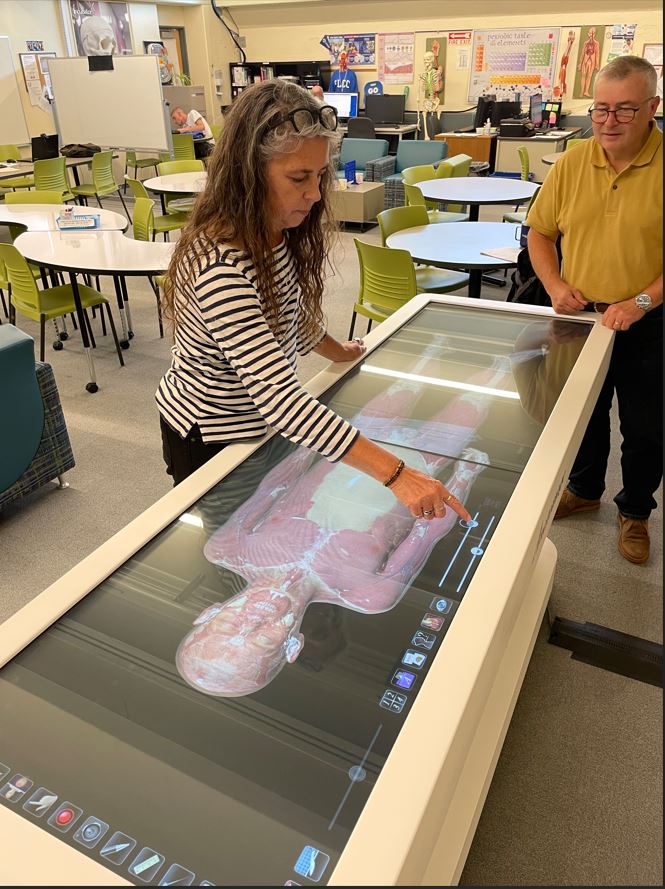
FLCC is piloting one of the latest medical education technologies – called an Anatomage table – to help students in health care programs master anatomy and physiology coursework.
The Anatomage table is an 84-inch touch screen that offers digitized images of human cadavers and interactive medical learning tools. The table features highly detailed segmentation of 2,950 structures in male and female cadavers.
“There is so much to learn,” said Melissa Miller, an FLCC professor in health science and human performance. “To our students, anatomy is basically a new language. We’re trying to find ways to reach our students.”
Today’s students are more comfortable learning with interactive digitals tools than with textbooks, she added.
Anatomy and physiology, called A&P, is a challenging course due to the sheer complexity of human body systems. It is required for several FLCC programs: nursing, kinesiology and human performance, health care studies, physical education and exercise science, and nutrition and dietetics.
Melissa said her own experience working with cadavers was transformative and happened while she attended Northeast College of Health Sciences in Seneca Falls, previously known as New York Chiropractic College. She had taken anatomy courses before and found them unremarkable. The ability to see actual human bones and organs – as opposed to textbook images and physical models – “changed everything I felt about anatomy and physiology,” she said.
It is not practical or cost-effective for community colleges to have cadaver labs. The digitized versions give a similar experience to many more students entering the health care field.
More health care graduates mean more qualified workers to fill shortages in nursing and other jobs in hospitals, clinics and nursing homes. FLCC offers programs to prepare students for licensure in licensed practical nursing and registered nursing. Health care studies, the most popular FLCC degree program, offers foundational courses that can lead to a wide range of careers in the field.
The College has been making targeted investments in nursing education for several years. In August 2022, FLCC opened the $7.2 million Sands Family Center for Allied Health. It began accepting a mid-year registered nursing cohort in January 2023; the first class graduates this December. This fall, FLCC launched a licensed practical nursing program.
Nursing students have already begun using the Anatomage table, for example, observing a birth simulation with life-size images that can be manipulated to see different angles or different levels of body structure.
The Anatomage table is housed in the Incubator, an academic support center for science students with professional tutors, models, and small group workspace. The Incubator opened in 2014 following a competition for internal grants to fund innovative ways to help students learn.
Like the Incubator, the Anatomage table is the result of a competitive internal grants process. Faculty and staff put forward proposals for funds set aside by the Board of Trustees for projects that would advance the College’s strategic goals of improving student retention and completion. After learning about the Anatomage tables at Northeast College of Health Sciences, Melissa submitted the successful proposal for the current table at FLCC.
The College welcomes high school biology classes to visit the main campus for an Anatomage table demonstration. Email to Melissa.Miller@flcc.edu.

